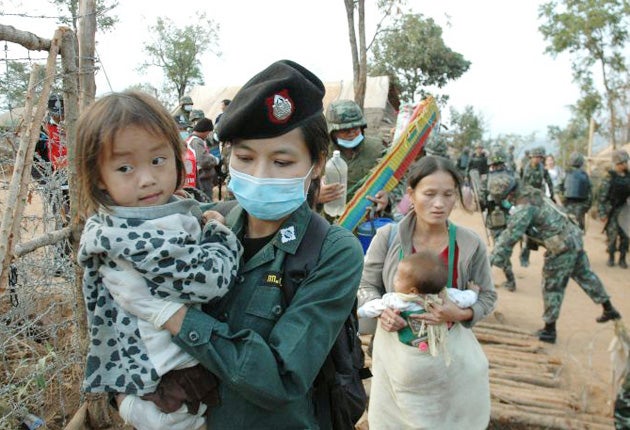Thailand sends 4,000 Hmong asylum-seekers back to Laos

Thai troops packed more than 4,000 ethnic Hmong into military trucks yesterday for a one-way journey to Laos, all but ending the Hmong's three-decade search for asylum following their alliance with the US during the Vietnam War.
The United States and rights groups have said the Hmong could be in danger if they are returned to the country that they fought, unsuccessfully, to keep from falling into Communist hands in the 1970s.
Although Thai soldiers were armed with batons and shields yesterday, Colonel Thana Charuwat said no weapons were used in the repatriation and the Hmong offered no resistance. The last of the group was expected to cross the border early today.
Many Hmong, an ethnic minority from Laos' mountains, fought under CIA advisers during Vietnam to back a pro-American Lao government – Washington's so-called "secret war" – before the Communist victory in 1975.
Since the war, more than 300,000 Lao, mostly Hmong, are known to have fled to Thailand and for years were housed in sprawling camps aided by international agencies. Most were either repatriated to Laos or resettled in third countries, particularly the US. Smaller numbers found refuge in France, Australia and Canada.
But now Thailand says it plans to close the camp it has emptied, which leaves only 150 known Hmong asylum-seekers in the country. They are kept in a prison near the Lao border and some of them have threatened suicide if they are returned to Laos. According to recent reports, though, some may be able to resettle in the United States and other countries.
The Thai government claims most of the Hmong are economic migrants who entered the country illegally and have no claims to refugee status.
Human Rights Watch, which is based in New York, called the deportation "appalling" and a low point for the Thai Prime Minister Abhisit Vejjajiva's government.
"Prime Minister Abhisit sinks Thailand's record on contempt for human rights and international law to a new low," said Sunai Phasuk, a Thai representative for Human Rights Watch.
US State Department spokesman Ian Kelly said in a statement that the United Nations and Thailand had in the past deemed that many of the Hmong in this group were "in need of protection because of the threats they might face in Laos".
"The United States strongly urges Thai authorities to suspend this operation," Mr Kelly said.
Mr Abhisit, however, said that Thailand had received "confirmation from the Lao government that these Hmong will have a better life".
The Hmong were driven out of the camp in military trucks and were then to be put on 110 buses going to the Thai border town of Nong Khai. Once in Laos, they will head to the Paksane district in the central province of Bolikhamsai, Col Thana said.
He added that 5,000 soldiers, officials and civilian volunteers were involved in the eviction. He said the troops carried no firearms and that their shields and batons met international standards for dealing with situations in which people are being moved against their will.
Join our commenting forum
Join thought-provoking conversations, follow other Independent readers and see their replies
Comments
Bookmark popover
Removed from bookmarks